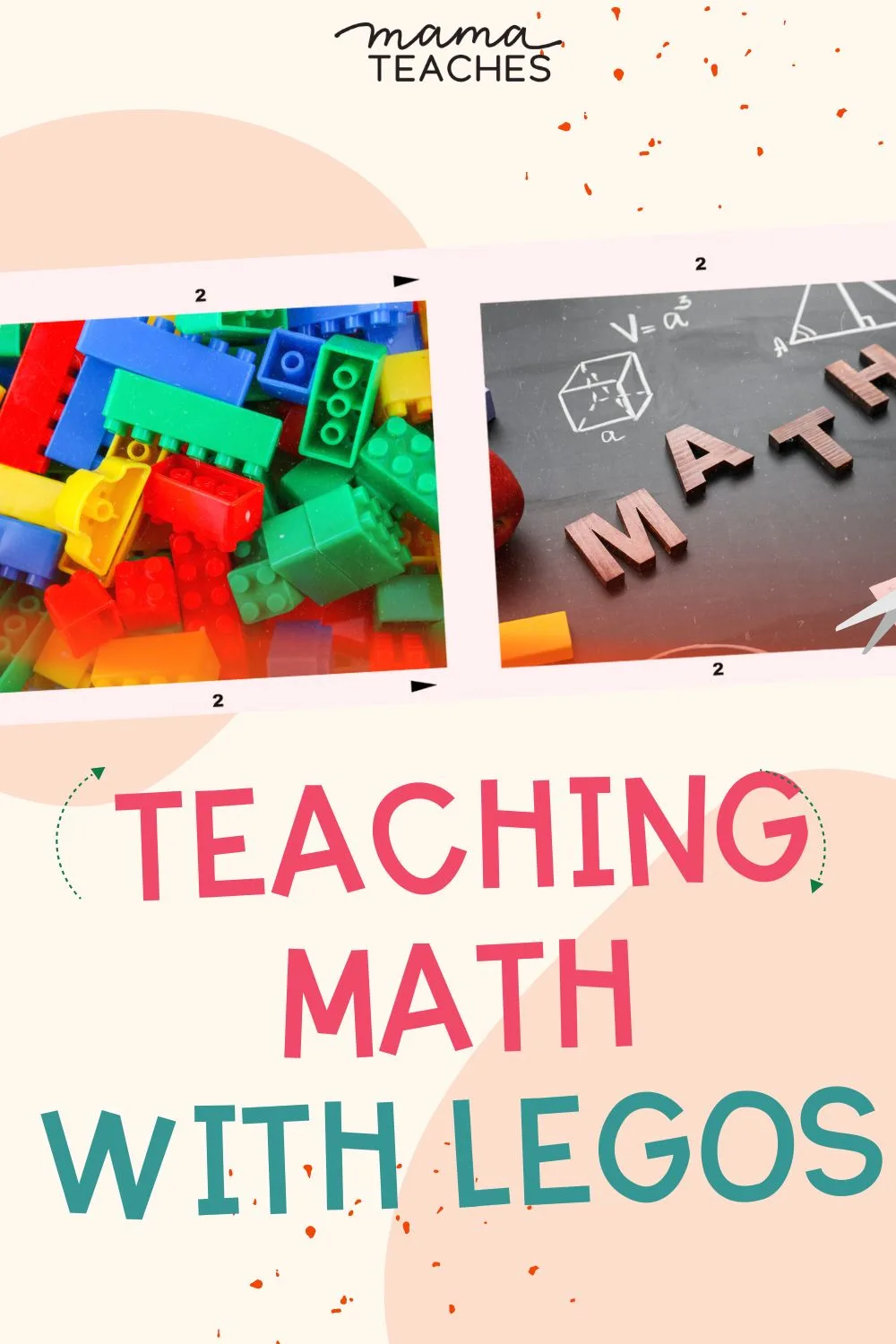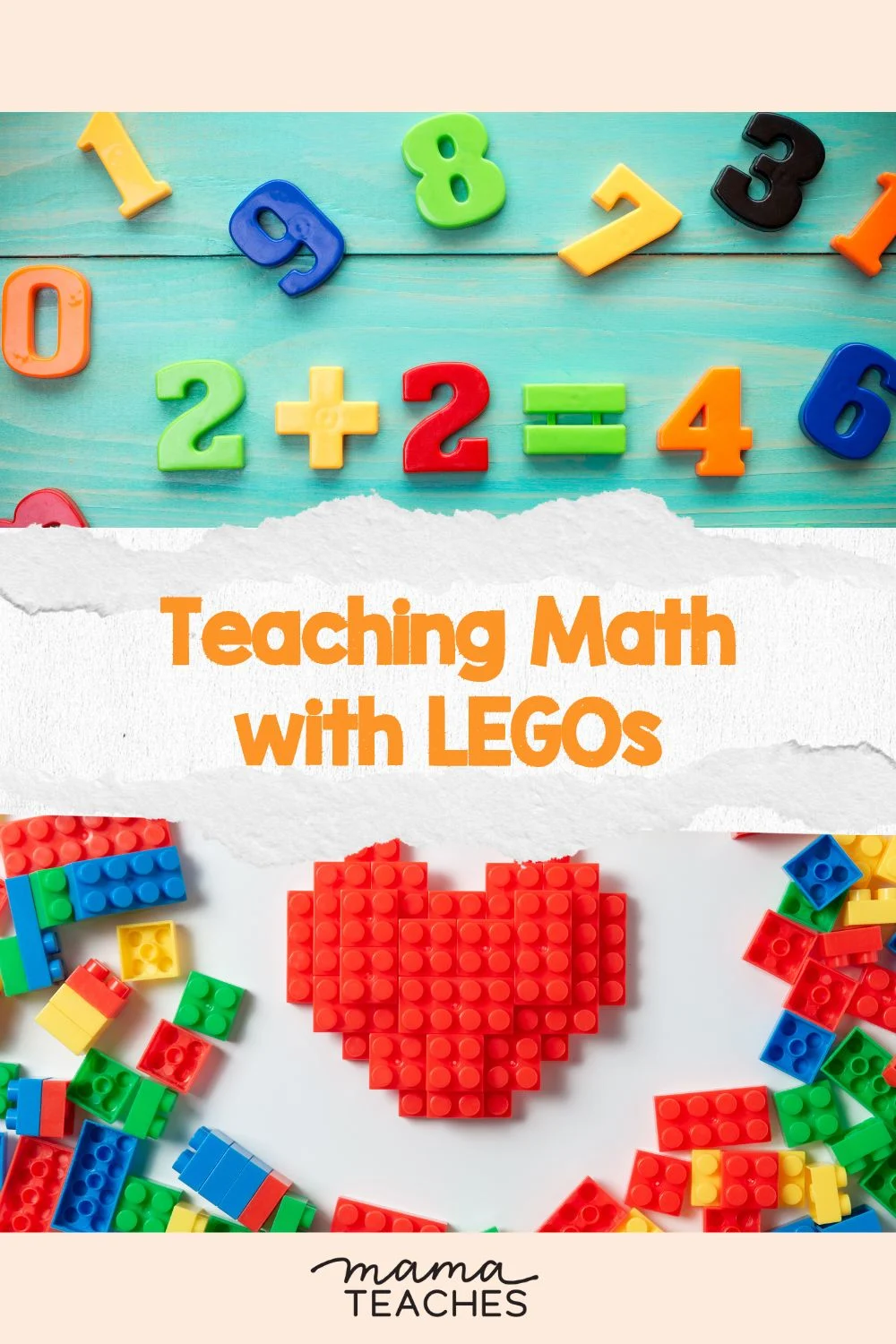Have you ever thought of using LEGOs to teach math? A fantastic math manipulative has been in your game closet all along!

Using LEGOs to Teach Math
LEGO bricks are small, colorful, and identically shaped like any great math manipulative.
Not only that, but they also have an immediate appeal for kids.
LEGO bricks snap together and adhere to base plates, which opens up a wide array of math activities.
These math activities involving LEGOs make math hands-on. This approach increases enthusiasm and retention.

This article contains affiliate links to things that you might like.
LEGO Products to Help with Math Instruction
If you want to use LEGOs to teach math, these LEGO products can help.
LEGO Duplo Number Train
This set comes with LEGO Duplo blocks for all the numbers 1-9.
LEGO Base Plates
A LEGO base plate gives you a sturdy surface to assemble all your LEGO bricks.
LEGO Creative Classic Bricks
You can use regular LEGO bricks for a wide range of math activities.
Using LEGOs to Teach Math
These LEGO math activities span all ages and levels of math.
Number Recognition
Use the numbered LEGO bricks from the train set to teach number recognition.
You can form higher numbers by placing them in pairs (“67”).
Counting
Use LEGO bricks for counting practice. Use all the same size LEGO bricks for this activity.
Patterns and Sequencing
Create LEGO patterns and sequences from different colors and/or different sizes of bricks.
Your child can determine the pattern and then extend it.

Skip Counting
Practice skip counting by arranging LEGO bricks in patterns that follow skip counting sequences.
Arrays for Multiplication
Create arrays with LEGO bricks. An array is a rectangle whose sides represent the factors and whose area shows the product.
For example, create a rectangle with a length of 6 LEGO bricks and a width of 5 LEGO bricks.
The total number of bricks in this rectangle is 30. This array shows that 6 x 5 = 30.
Arrays of LEGO bricks are a visual way to introduce the concept of multiplication as repeated addition. Six rows of 5 LEGO bricks consist of 30 LEGOs.
Word Problems
Make word problems infinitely more interesting by using LEGO Minifigures.
They can illustrate simple word problems involving addition, subtraction, multiplication, and division.
Geometry
Build 3D shapes with LEGO bricks to explore geometry and spatial awareness.
Fractions
Introduce fractions by dividing LEGO brick creations into equal parts.
For instance, you can build a tower of ten LEGO bricks where three are yellow and seven are blue.
What fraction of the tower is yellow?

Measurement
Any item of standard size can work as a unit of measurement. Why not LEGOs?
Choose a standard LEGO size, like a 2×4 brick (it has eight dots).
You can measure small objects using LEGO bricks laid end to end.
How long is a piece of paper? A pencil? A fork?
You can compare the lengths, widths, and heights of different objects.
Symmetry
Explore symmetry and mirror images by building symmetrical structures with LEGO bricks.
Mount them on a base plate to keep them steady.
Place Value
Demonstrate place value using different colored LEGO bricks to represent ones, tens, and hundreds.
Alternatively, you can use the numbered LEGO Duplo bricks and rearrange them to show how the values of the numbers change depending on position.
Graphing
Use LEGO baseplates for graphing activities to create visual representations of data.
You can create pictographs or bar graphs with LEGO bricks.
Coding and Robotics
Integrate LEGO robotics for hands-on STEM learning and programming challenges.
Probability
Use a container of LEGO bricks to illustrate dependent and independent probability and conduct experiments.
For example, “What is the probability of pulling two white bricks in a row?”

How to Use LEGO Bricks to Teach Math
LEGO bricks are the secret to making math instruction both fun and effective.
Using LEGOs to teach math will make math your child’s new favorite subject!
